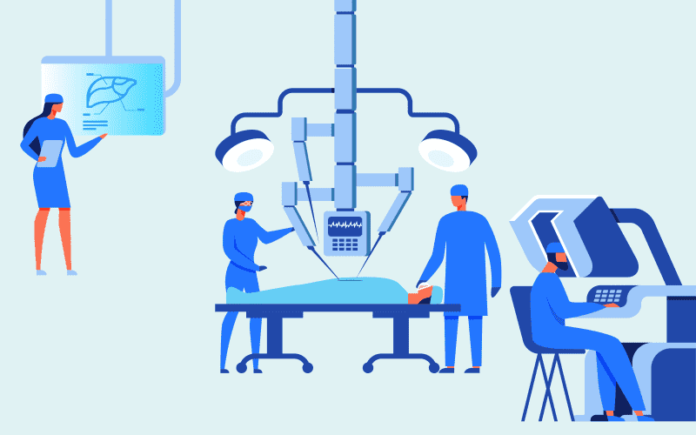Biomedical engineering focuses on improving the quality of life through innovative medical technologies. The following article discusses the fields in biomedical engineering, including medical imaging, rehabilitation, and clinical engineering.
What are the Current Biomedical Engineering Fields?
Biomedical engineering has several fields, including the following:
Bioinstrumentation
Bioinstrumentation is a specialty that is based on the design of tools and equipment for diagnosing and treating diseases of all kinds with the help of computers and other electronic devices, and these devices are high-tech and expensive and are used to conduct advanced research in the biological sciences.
Biomaterials
Biomaterials is the field specialized in the rapidly developing biomaterials industry, where biomaterials engineers apply their studies in engineering and biology to the design and development of health products and systems, Biomaterials help facilitate recovery for people after illness, and can be These materials are natural or synthetic and are used to support or replace damaged tissues or biological functions, as well as support tissue regeneration and nanoparticles that can detect cancers, and these materials must be tested to ensure their safety before using them in the human body.
Biomechanics
Biomechanics focuses on the force affecting the movement of objects and is based on the study of biological systems in terms of their structure and function.
This field combines physical and engineering expertise with biological and medical sciences. Biomechanical engineers manufacture products such as heart valves. Prosthetics and artificial joints that helped people and made their lives less painful.
Genetic, Cellular and Tissue Engineering
Genetic engineering, cellular, and tissue engineering is the production of living tissues outside the body and their replacement or the use of therapeutic applications through the generation of materials, biochemical processing, cell culture, and genetic engineering, this field focuses on preventing or stopping diseases through gene alteration and stem cell therapy.

Clinical Engineering
Clinical engineering engineers work in the application of biological research and development of healthcare settings such as hospitals and physicians’ places, and this field trains doctors, nurses, and other medical professionals in the use of advanced technologies with patients.
Orthopedic Bioengineering
The field of orthopedic bioengineering combines principles of tissue engineering, cell biology and biomechanics to develop new concepts of bone and soft tissue, where bones, muscles, and joints are damaged or destroyed by accidents or disease, and engineers in this field develop special orthopedic products that allows better movement and performance so that it offers a better life for people and their bodies can regain their lost function.
Rehabilitation Engineering
Rehabilitation engineering uses engineering principles to develop solutions and devices that help individuals with disabilities meet their needs such as movement, communication, hearing and vision, and also help improve ways to restore bodily functions lost due to congenital disorders or diseases such as stroke or injury, loss of limbs to restore mobility, it also has the potential to develop brain-computer interfaces that allow individuals with disabilities to operate computers or other devices by thinking about the task they want to perform.
Systems Physiology
The field of Systems physiology uses engineering principles and tools to understand how different organisms function.
Neural Engineering
Neural engineering engineers are interested in understanding and interacting with the nervous system.
Engineers create computer models of complex nervous systems or single neurons.
Scientists know how neurons communicate with each other and provide new ways of interacting between nervous tissues and technologies and this is called brain-machine communication.
Read Also
- Mastery Forge Webinar Platform – Choose Your Webinar
 We live in a time when knowledge is literally at your fingertips. You no longer have to go on long courses, wait for free places or adapt to a rigid schedule of classes. All you need is the Internet, a little willingness and you have access to training courses conducted by experts from all over… Read more: Mastery Forge Webinar Platform – Choose Your Webinar
We live in a time when knowledge is literally at your fingertips. You no longer have to go on long courses, wait for free places or adapt to a rigid schedule of classes. All you need is the Internet, a little willingness and you have access to training courses conducted by experts from all over… Read more: Mastery Forge Webinar Platform – Choose Your Webinar - Beyond the Blueprint: Why Integrated Electronics Manufacturing Beats Fragmented Sourcing
 Bringing an electronic product to market is a complex orchestration of design, engineering, manufacturing, and logistics. The days of siloed operations, where a company would design a product and then simply hand off the blueprints to a contract manufacturer, are largely disappearing. In their place, a more integrated and efficient model has emerged: end-to-end electronics… Read more: Beyond the Blueprint: Why Integrated Electronics Manufacturing Beats Fragmented Sourcing
Bringing an electronic product to market is a complex orchestration of design, engineering, manufacturing, and logistics. The days of siloed operations, where a company would design a product and then simply hand off the blueprints to a contract manufacturer, are largely disappearing. In their place, a more integrated and efficient model has emerged: end-to-end electronics… Read more: Beyond the Blueprint: Why Integrated Electronics Manufacturing Beats Fragmented Sourcing - Hardened shelter solutions reshape how military operations stay safe and functional in the field
 Difficult terrain, unpredictable threats and long deployments have driven modern militaries to reconsider how they create safe, reliable spaces in the field. Rigid wall shelters and container-based structures are becoming the quiet backbone of operations, offering durability, mobility and real comfort for the troops and support teams. When most people think of military bases, they… Read more: Hardened shelter solutions reshape how military operations stay safe and functional in the field
Difficult terrain, unpredictable threats and long deployments have driven modern militaries to reconsider how they create safe, reliable spaces in the field. Rigid wall shelters and container-based structures are becoming the quiet backbone of operations, offering durability, mobility and real comfort for the troops and support teams. When most people think of military bases, they… Read more: Hardened shelter solutions reshape how military operations stay safe and functional in the field - The Function of a CRO for Clinical Trials: Structure, Responsibilities, and Operational Impact
 Clinical trials rely on organized systems that ensure scientific validity, participant protection, and regulatory compliance. As protocols become more intricate and studies expand across multiple regions, many sponsors collaborate with specialized partners to manage key operational and methodological tasks. A CRO for clinical trials provides this structured support, coordinating the activities required to move a study from… Read more: The Function of a CRO for Clinical Trials: Structure, Responsibilities, and Operational Impact
Clinical trials rely on organized systems that ensure scientific validity, participant protection, and regulatory compliance. As protocols become more intricate and studies expand across multiple regions, many sponsors collaborate with specialized partners to manage key operational and methodological tasks. A CRO for clinical trials provides this structured support, coordinating the activities required to move a study from… Read more: The Function of a CRO for Clinical Trials: Structure, Responsibilities, and Operational Impact - Innovative Strategies for Marketing Neuropathy Treatments
 Living with neuropathy can be difficult, both physically and mentally. As a healthcare professional, you see how much it affects your patients and how important it is to find treatments that truly help. But with new medical updates and a fast-changing digital world, marketing neuropathy treatments can feel overwhelming. This is where fresh, practical strategies… Read more: Innovative Strategies for Marketing Neuropathy Treatments
Living with neuropathy can be difficult, both physically and mentally. As a healthcare professional, you see how much it affects your patients and how important it is to find treatments that truly help. But with new medical updates and a fast-changing digital world, marketing neuropathy treatments can feel overwhelming. This is where fresh, practical strategies… Read more: Innovative Strategies for Marketing Neuropathy Treatments
Biomedical Engineering Jobs
The following are some of the jobs in the field of biomedical engineering, and they are as follows:
Biomaterials Developer
Engineers develop biomaterials that may be natural living tissue or synthetic materials.
Manufacturing Engineer
A manufacturing engineer works to create low-cost, high-quality goods, and to make products such as laboratory equipment and prosthetics.
Independent Consultant
The independent consultant works with medical organizations and research institutions by providing advice and recommendations.
Biomedical Researcher
They conduct research that helps improve human health.
Rehabilitation Engineer
The engineer performs rehabilitation on projects as diverse as mechanical equipment or virtual reality systems.
Medical Technology Developer
The engineer develops hardware and software that assist in the manufacture of medical devices.






